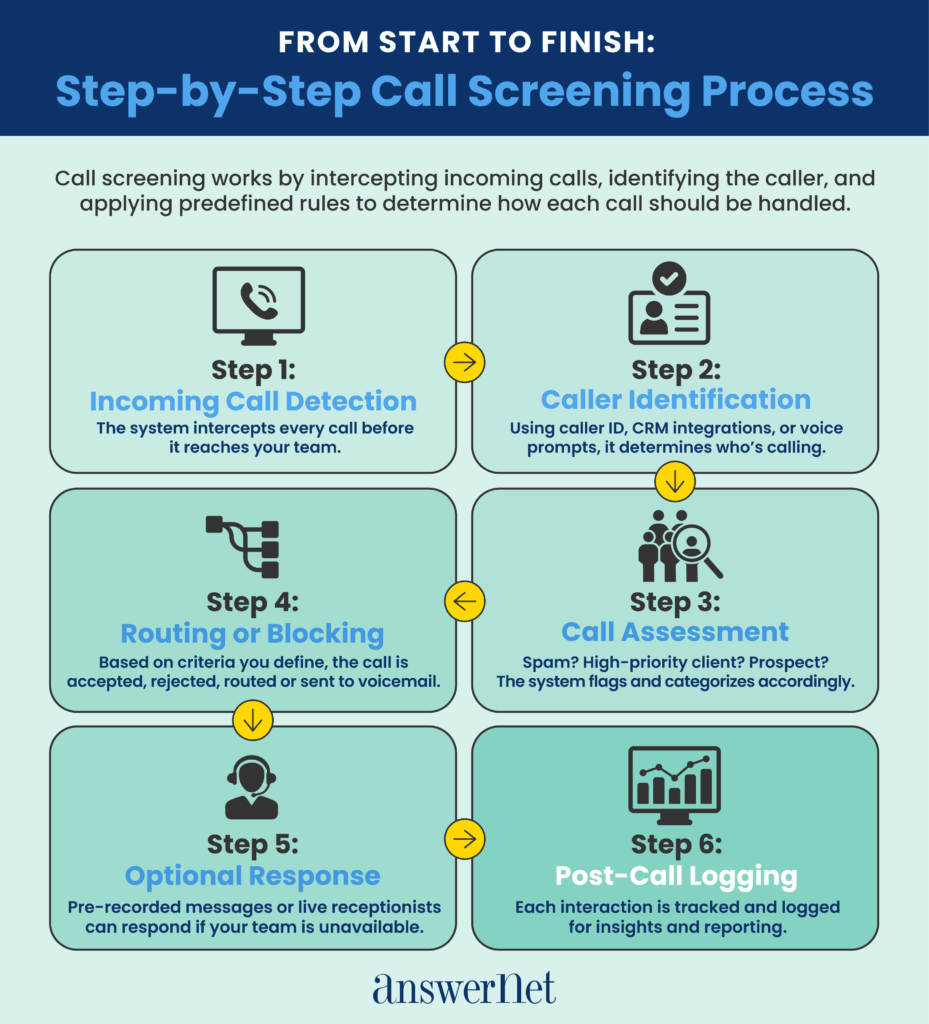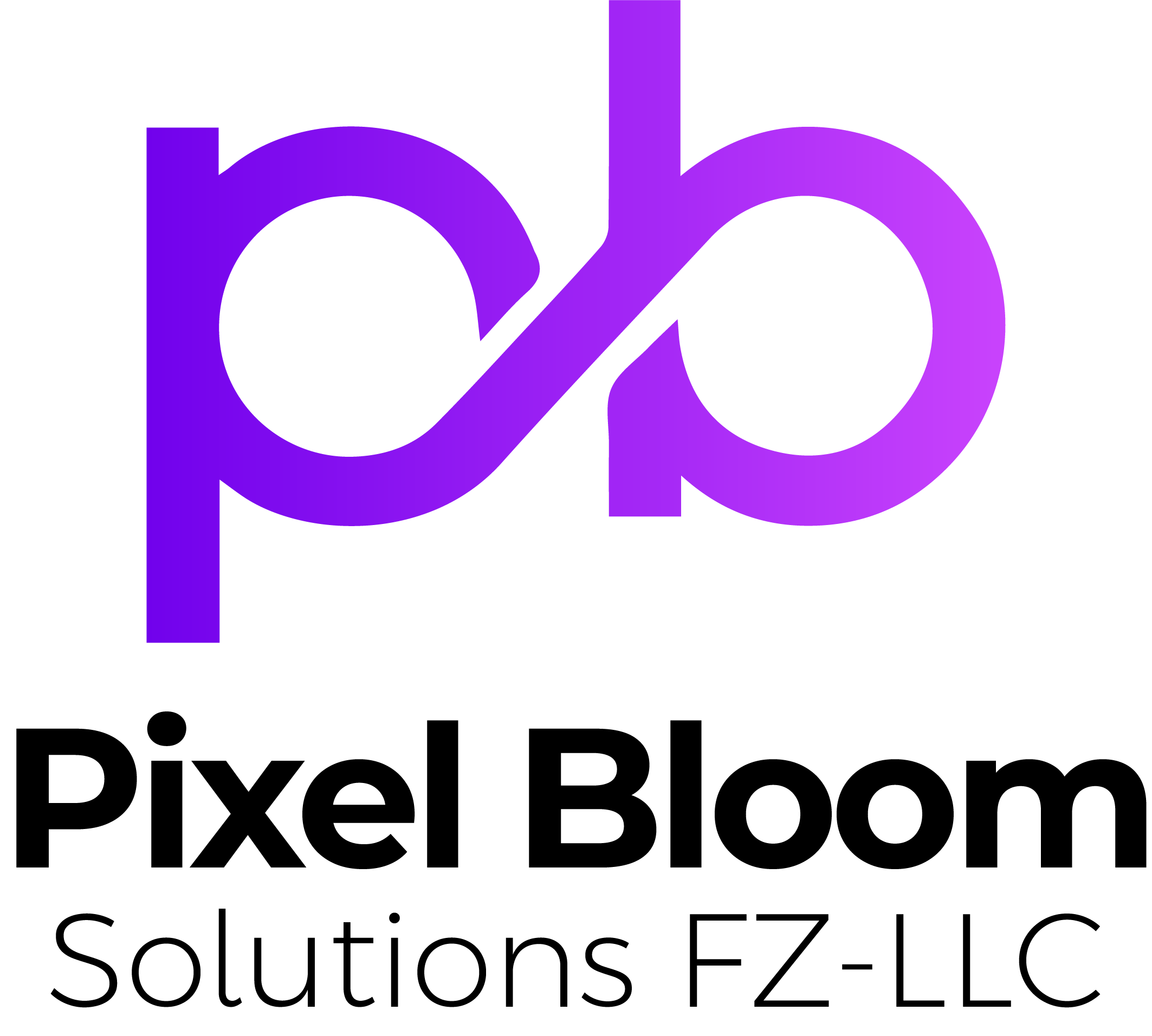With call volume hitting fever pitch, not all callers deserve your time or attention.
There are spam calls, robocalls, and low-priority inquiries taking up valuable time. Unsanctioned phone traffic can sap the vigor out of your team, disrupt workflows, and generally reduce productivity. That’s exactly where call screening can help you take control and maintain efficiency.
Whether you are a small business owner wearing many hats or a growing organization fielding dozens of calls each day, understanding call screening and how it works is essential to keeping distractions at bay and spending time on meaningful customer engagements.
What Is Call Screening?
Summary: Call screening is the method of identifying, assessing, and managing your incoming calls based on visible criteria like caller ID, as well as intent or urgency.
Call screening enables businesses to eliminate distractions, assess the caller to determine whether they want to hear a sales pitch from a bot, identify if they are an informed lead, or recognize if there is an important phone call they wish to speak with an actual human associate from your business. In businesses, call screening is an immediate and actionably aware communication service located within the telecommunications provisioning of a telephone company. Important calls will come in to a person or team best suited to discuss it with the prospect, thereby creating time for calls, obeying local privacy laws, and preventing distractions for serious business. Allowing teams pre-event virtual communication is crucial for a successful event, collaboration assignment, or meeting.
Other benefits to screening calls in your business include:
- Reduction in or even elimination of spam/robocalls / irrelevant sales calls
- Prioritization of all high-value leads and loyal clients
- Routing of calls to the appropriate person, department or or extension
- Supports compliance with privacy regulations (e.g., TCPA, GDPR) by controlling who accesses sensitive calls and data.
Call screening is more nuanced than call barring. Instead of blocking calls indiscriminately, it enables your team to evaluate the context—such as who is calling, their intent, and your team’s availability—before deciding how to proceed.
Why Businesses Can’t Afford to Ignore Call Screening
Every call matters—but not equally. If your team is constantly interrupted by low-priority or irrelevant calls, you risk:
- Reduced focus on core tasks
- Delays in responding to key customers or leads
- Higher stress levels and workplace burnout
- Missed opportunities due to cluttered communication
According to YouMail’s “Robocall Index”, U.S. consumers received nearly 5 billion robocalls in April 2025 alone, representing a 3% increase from the previous month. This increase highlights the growing urgency for businesses to implement call screening systems that filter unwanted calls before they disrupt operations. A study by Hiya (“State of the Call 2023”) found that consumers spent an average of 32 minutes per week screening unwanted calls. For a team of 10, that scales to over 160 work-hours lost per year—time that could be spent on revenue-generating tasks.
And while caller ID and voicemail offer some level of filtering, they fall short in real-time responsiveness. Call screening, on the other hand, keeps your team agile and protected.
Here’s why more businesses are integrating it into their call center phone setup:
- Boosted Productivity: Less time wasted on interruptions means more time focused on sales, service and strategy.
- Better Customer Service: Screened calls can be directed immediately to the person best equipped to help, cutting wait times and improving satisfaction.
- Enhanced Lead Management: Sales teams can prioritize qualified leads and avoid distractions from cold calls or bots.
- After-Hours Control: Screening tools can identify urgent requests and escalate them, while non-critical calls are deferred or sent to voicemail.
- Smarter Resource Allocation: Not every call needs a senior rep—screening routes the right issues to the right people.
How Screening Works Behind the Scenes
Summary: Call screening works by intercepting incoming calls, identifying the caller, and applying predefined rules to determine how each call should be handled.
The process usually includes automatic call detection and checking caller details through caller ID or CRM integration. Webex reports that CRM-integrated screening enables 80% of calls to be answered in under 20 seconds, and 76% of users say it improves access to caller data—making it easier to triage inquiries and reduce response delays. The system then assesses the nature of the call and either answers it, forwards it, sends it to voicemail, or blocks it entirely. The system may also log each call to support reporting and call analytics.
Modern call screening systems are critical due to the sheer volume of spam and robocalls. According to Hiya, in 2023 over 28% of the 46.75 billion unknown calls in the U.S. were classified as spam or fraud. This underscores why automated filtering via CRM-integrated systems is essential for business continuity. By identifying and blocking these calls early, businesses ensure that their teams remain focused on genuine customer interactions.

Here’s a quick breakdown of how the process flows:
- Incoming Call Detection: The system intercepts every call before it reaches your team.
- Caller Identification: Using caller ID, CRM integrations, or voice prompts, it determines who’s calling.
- Call Assessment: Spam? High-priority client? Prospect? The system flags and categorizes accordingly.
- Routing or Blocking: Based on criteria you define, the call is accepted, rejected, routed or sent to voicemail.
- Optional Response: Pre-recorded messages or live receptionists can respond if your team is unavailable.
- Post-Call Logging: Each interaction is tracked and logged for insights and reporting.
It’s fast, accurate, and fully customizable. With those essentials in place, the next step is finding the right partner.
Choosing the Right Call Screening Partner
Here are the features to look for when evaluating a provider:
- Easy integration with your existing call center phone systems or VoIP setup
- Options for live virtual receptionists or fully automated workflows
- Clear dashboards and routing rules
- Support for CRM, scheduling, and call logs
- Strong data privacy and call security features
While some businesses opt for in-house receptionists, many are turning to virtual receptionist services that can handle call screening and beyond—without the overhead.
Why Call Screening with Pixel Bloom Solution Makes the Difference
Summary: Pixel Bloom Solution's Virtual Receptionist service includes call screening that helps businesses focus on what matters by managing incoming calls efficiently and professionally.
Our trained receptionists follow your specific routing rules and use custom scripts to identify and prioritize calls. According to Callin, companies that implement full-service call screening report a 30% reduction in time spent on low-priority or spam communications, leading to more meaningful interactions. This ensures key conversations reach the right people, while low-value or disruptive calls are filtered out, redirected or handled appropriately—all without overwhelming your internal team.
WithPixel Bloom Solution ’s Virtual Receptionist Service, you can:
- Reduce interruptions and increase productivity
- Eliminate robocalls and spam before they reach your team
- Route urgent matters to the right team members instantly
- Prioritize high-value leads and customers
- Maintain a consistent brand voice, 24/7
Whether you run a solo law firm, a bustling medical office, or a multi-location service business, our call screening capabilities are designed to scale with your needs—so you stay focused, responsive, and in control.
Ready to Take Control of Your Phone Lines?
Don’t let another spam call waste your time or distract your team. WithPixel Bloom Solution ’s call screening and virtual receptionist support, you don’t just avoid interruptions—you elevate your customer experience.
Let us show you how smarter call screening can transform your business communication.







